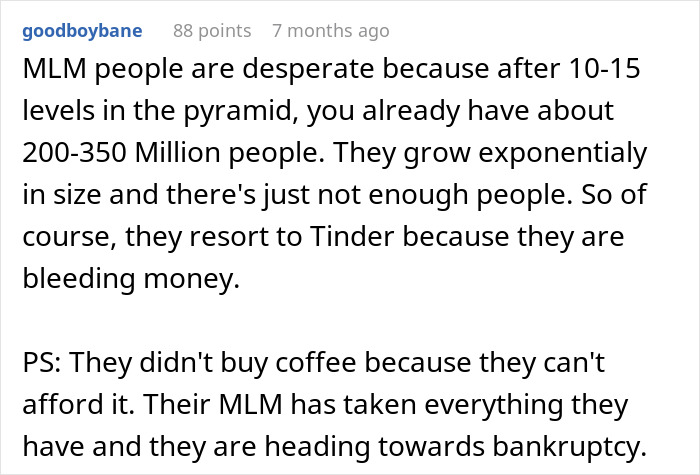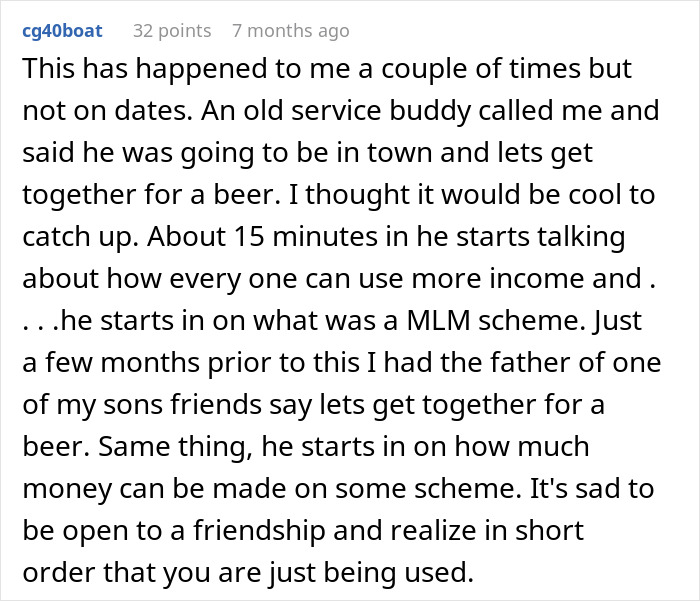
“I Laughed So Much On The Way Home That I Was Crying”: Guy Goes On A Date With A Really Pretty Girl, It Ends Up Being A Pyramid Scheme Scam
“Hey girly! You seem like you’d be interested in running your own business. Let me tell you about a way you can earn $5k per month by working alongside fellow girl bosses!”
It’s well known at this point that MLMs have a shady business model, but somehow, they persist. And they manage to show up where you least expect them, including on a Tinder date. Below, you’ll find a story that one man recently shared on the “TIFU” subreddit, detailing how his date had ulterior motives.
MLMs are notorious for being relentless in their recruiting tactics
Image credits: westend61 (not the actual photo)
As this man quickly learned, even a date isn’t immune from their pitches
Image credits: Good Faces Agency (not the actual photo)
Image credits: Andrea Piacquadio (not the actual photo)
Image credits: SlimVali
It’s well known that MLMs are essentially synonymous with pyramid schemes
Multi-level marketing companies, or MLMs, has been around since at least the 1920s, with brands like Nutrilite and Avon making their starts back then. “As the name implies, this direct form of selling involves people and building a network of people as sales distributors,” Management Study Guide explains. “Typically in MLM, the individuals take up distributorship from the Company in the first instance. The distributor works as a sales person too. Selling happens through identifying and recruiting a new distributor for the network. Every distributor happens to become a buyer as well for he starts using the product for self, for family and friends. Thus the sales take place through self use as well as through the distributors who have been enrolled by the individual.”
As complicated as it may sound, this form of marketing, which is also referred to as “pyramid selling”, is now often associated with cringey messages from girl bosses on social media and scams that are sure to cost you much more money than they make you. Technically, pyramid schemes are supposed to involve no real products, while participants make their money solely by recruiting other participants, and MLMs are distinguished by actually having physical products to sell, which can be anything from protein powder to clothing items to makeup. However, there are striking similarities between the two as well: pyramid-style business models; sellers have to pay a certain amount of money up front; recruitment is a key component; and they both tend to make glamorous claims to gain recruits.
Image credits: friends_stock (not the actual photo)
They’re known to make extravagant promises to recruits, only to exploit them
Although MLMs are technically legal, they certainly fall within some ethical gray areas. MLMs are notorious for targeting vulnerable individuals, including people who are lonely, like stay-at-home moms, army wives and single parents, those who desperately need money like low-income individuals and minorities, and folks with disabilities and chronic illnesses. People who are comfortable and well off are not likely to fall for the claims made by MLM recruiters who promise high earnings and little effort, so they know exactly what kinds of people to search for. Recruiters tout all of the “amazing benefits” of having a flexible job without any limits on how much “business owners” can earn, but the reality is that very few people are actually profiting from these types of companies.
Even the United States Federal Trade Commission warns that, “Most people who join legitimate MLMs make little or no money. Some of them lose money. In some cases, people believe they’ve joined a legitimate MLM, but it turns out to be an illegal pyramid scheme that steals everything they invest and leaves them deeply in debt.” When joining an MLM, “business owners” are required to buy a certain amount of products up front to then sell to customers and to their own “down lines”. To keep earning, everyone is expected to vigorously recruit more individuals and continue growing the pyramid. “Without a steady stream of new prospects, your MLM business will eventually die out,” Matt Zavadil explains on his site.
Image credits: vladans (not the actual photo)
These “business owners” are actually more likely to lose money than to make any
Most legitimate jobs would never ask employees to pay any money up front or work as recruiters and salesmen simultaneously. But somehow, MLMs are able to continue their questionable business methods through promises of being “self-made” or “running your own business”. Meanwhile, they’ve been ruining employees’ lives for decades. “Joining an MLM is appealing to women who find hope in their promises of a better life: freedom, economic independence, and an endless supply of cheery trinkets,” Alden Wicker writes for Quartz, in an analysis breaking down the problems of one famous MLM, LuLaRoe. “Despite professing quick-income prospects though, it’s difficult for MLM consultants to earn more than pocket change. When glitzy recruitment videos yield to the reality of suburban cul-de-sacs, people selling for MLMs can be plunged into debt and psychological crisis.”
Thankfully, the man who shared this post on Reddit knew that he had no interest in joining an MLM, but unfortunately, many other people out there have no idea what they’re getting themselves into when they sign up. We would love to hear your thoughts on this situation in the comments below, pandas. Have you ever had any experiences with MLMs? And how would you have reacted if you were on this date? Feel free to share your thoughts, and then if you’re interested in reading another Bored Panda article discussing the dangers of MLMs, look no further than right here.
Image credits: cottonbro studio (not the actual photo)
Many readers called out the woman and shared their distaste for MLMs in the comments
I sat through one of these on work related to stocks and forex...at the end I asked "so would you say the shape of this model is fairly triangular?" and the guy was like "yup" lol
@JuliaParker well speak of the devil... "It's not like a pyramid, ours is all wonky"
Load More Replies...I might have asked for my coffee in a takeaway cup so I could leave!
Former MLM distributor here. (In my defense, I was 19-20 y.o. at the time.) About 20 years ago, these scams were pretty new and not much was known about them in Europe, so you could easily fall for them. I guess I was the worst MLM distributor ever, with no team and very few individual sales. I was unable to tell people that they'd quickly earn hundreds of dollars by "investing" their money in a MLM scheme (disguised as "business opportunity"). In spite of all the "trainings", I knew it was a lie. Money don't just come like that. And I was also unable to tell people they'd lose weight and maintain after that, regardless of their lifestyle, because this was also a lie. Now I'm happy I didn't convince people to join it.
Ah... good old Herbalife, the mother of all MLMs in EUrope :-D
Load More Replies...I sat through one of these on work related to stocks and forex...at the end I asked "so would you say the shape of this model is fairly triangular?" and the guy was like "yup" lol
@JuliaParker well speak of the devil... "It's not like a pyramid, ours is all wonky"
Load More Replies...I might have asked for my coffee in a takeaway cup so I could leave!
Former MLM distributor here. (In my defense, I was 19-20 y.o. at the time.) About 20 years ago, these scams were pretty new and not much was known about them in Europe, so you could easily fall for them. I guess I was the worst MLM distributor ever, with no team and very few individual sales. I was unable to tell people that they'd quickly earn hundreds of dollars by "investing" their money in a MLM scheme (disguised as "business opportunity"). In spite of all the "trainings", I knew it was a lie. Money don't just come like that. And I was also unable to tell people they'd lose weight and maintain after that, regardless of their lifestyle, because this was also a lie. Now I'm happy I didn't convince people to join it.
Ah... good old Herbalife, the mother of all MLMs in EUrope :-D
Load More Replies...
 Dark Mode
Dark Mode 

 No fees, cancel anytime
No fees, cancel anytime 















































































74
43